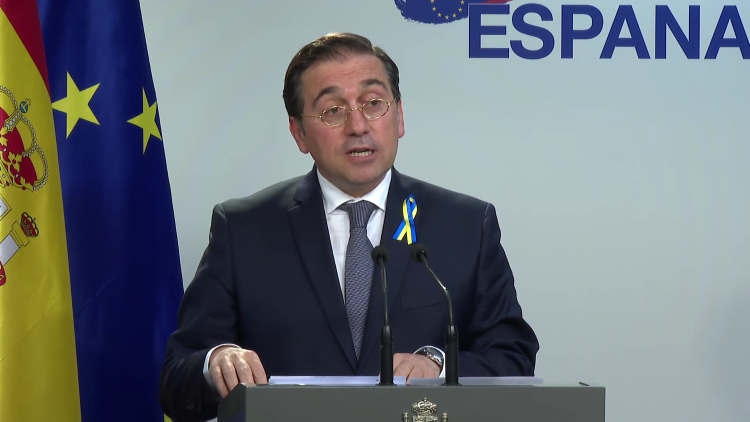Eduardo González
The rise of insecurity and organized crime in Latin America is becoming the breeding ground for the rise of “punitive” authoritarianism by leaders such as Nayib Bukele, in El Salvador, who promote the belief that Security is only guaranteed if one acts “outside the rule of law.”
These are some of the conclusions of the report ‘Iberoamerica 2024. The security challenge for Latin American democracies’ by the Alternativas Foundation, presented this past Thursday at the headquarters of the Ibero-American General Secretariat (SEGIB) in Madrid.
According to the document, the insecurity crises that Latin America is experiencing have become “a real threat to democracies.” Citizen insecurity, exacerbated by organized crime, the advance of drug trafficking and endemic violence, “not only destroys human lives and well-being, but also erodes trust in the State and its institutions,” which, together with impunity, Corruption and inefficiency in the administration of justice creates “a vicious circle that weakens the very foundations of democracy and the social contract.”
In these circumstances, the continent is experiencing a rise in “authoritarian populism,” as is the case of Nayib Bukele, who represents a “concrete threat” to democracy in Latin America because he promotes the belief that, in order to guarantee a public good, elemental as security, it is better to “act outside the rule of law.” In the case of Ecuador, despite the significant levels of violence by organized criminal groups, the Government of Daniel Noboa “maintains its security policy within the limits of the Constitution, beyond having decreed measures such as the state of exception that restrict rights and freedoms.”
Allamand and Bachelet
During the presentation of the event, Andrés Allamand, Ibero-American Secretary General, recalled that, due to the “enormous problems of increased crime, organized transnational crime and insecurity”, the homicide rate is “three times higher in Latin America than in the rest of the world”. “We are facing a phenomenon with multiple effects, there is no single cause, and the effects are also multiple,” he continued.
Insecurity, he stated, “affects social coexistence, increases distrust between people, affects the quality of life and makes it impossible to exercise people’s daily rights.” Furthermore, insecurity generates a strong economic impact, since “the amount to combat organized crime represents 3.5 percent of the regional GDP” (a percentage that “exceeds what the region has grown in recent decades in terms of average”), as a politician, because it generates a growing “rejection of the system.” “Support for the democratic system as the best form of government has had a noticeable decrease,” while “support for authoritarian regimes not only decreases, but increases,” he added.
For her part, Michelle Bachelet, former president of Chile and former United Nations High Commissioner for Human Rights, warned by videoconference that, although “democracy is the best system we have, if it does not respond to the problems of people or does not keep its promises becomes unreal” and, for this reason, as surveys show, people increasingly tend to prefer “an efficient regime, even if it is authoritarian.” In this regard, she recalled that, according to the Latinobarómetro 2023, only 48% of Latin Americans support democracy in the region (a decrease of 15 percentage points from 63% in 2010) and that, between 2022 and 2023, the number of people who prefer an authoritarian government increased in all countries except Panama.
Therefore, at a time when “fear has become a political actor in itself,” it is necessary to promote “a global understanding of the problem of insecurity and reinforce regional solidarity mechanisms,” because “no there are human rights without democracy and democracy without human rights.”
Vicente Palacio, director of Foreign Policy at the Alternativas Foundation, warned that the increase in insecurity reflects “a certain failure” of the economic model, which “is not capable of integrating all layers of the population,” which makes it in “a very dangerous breeding ground for populism.”
As Érika Rodríguez, coordinator of the Report and director of the Carolina Foundation, explained during the event, the problem in Latin America goes “beyond drug trafficking.” “We cannot lose sight of cybercrime, since it is a very predatory element of the social system.” For her part, Lucía Dammert, co-author of the Report and sociologist at the University of Santiago de Chile, highlighted by videoconference the importance of involving Europe in the matter, since the “enormous growth” of illegal markets, not just drugs, but also minerals “like gold”, is focused on the Old Continent, with “profits almost as high as those of drug trafficking.”
In addition, Mariano Bartolomé, member of the Inter-American Defense College, agreed with Dammert on the need to “de-narcotize” the agenda, since the region also suffers “human trafficking, smuggling, clandestine gambling, corruption of public works, counterfeiting or gold trafficking. All of these crimes generate a “huge amount of money laundering, but we must not encourage prevention and repression, but rather address the whole issue in a more holistic way,” he warned.







